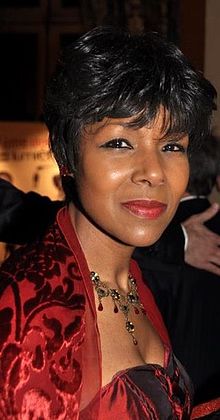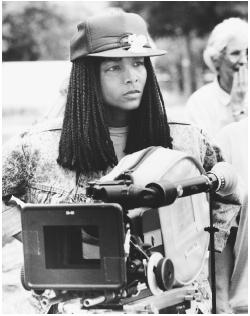
Born in Martinique, Euzhan Palcy earned a film degree, specializing in cinematography, from Louis Lumière College in Paris. She became the first black female director to have a film produced by a major Hollywood studio when MGM produced A Dry White Season (1989). Adapted from South African writer André Brink’s novel, A Dry White Season focused on the politics of South African apartheid and was such a compelling project that it attracted actor Marlon Brando to come out of a self-imposed retirement to fulfill the project’s vision.
Many of Palcy’s films explore global issues of race, gender and politics from a feminist perspective. Her first feature, Sugar Cane Alley (1983), about the teenage life and adventures of a young boy who lives in a shanty-town in Martinique in the mid-’30s, won over 17 awards on the international film circuit, including the Venice Film Festival’s Silver Lion award and the César Award, which is the French best picture Academy Award.
[youtubegallery cols=2000]
MoMA Interview 2011 |http://www.youtube.com/watch?v=R_o8LO2luWc&feature=related
Director’s Reel |http://www.youtube.com/watch?v=ofee4TYrUAA&feature=related
Cannes Interview 2011|http://www.youtube.com/watch?v=jxw-ehvYh0s
[/youtubegallery]
Some of her other works include Siméon (1992), a musical comedy fairytale set in the Caribbean; the made-for-television productions Ruby Bridges (1998) about segregation in New Orleans from the perspective of a young child and The Killing Yard (2001) about events surrounding the 1971 Attica prison uprising; Les Mariées de I’isles Bourbon (2007), a historical epic about forced marriage in 17th-century France; the documentary Parcours de Dissident (2006), about the forgotten history of West Indian patriots during World War II; the biographical documentary Aime Cesaire, A Voice for History (1994); and How Are the Kids? (1993), a six-film anthology depicting childhood horrors around the world.
New York City’s Museum of Modern Art (MoMA) recently honored Palcy in May 2011 with a special Filmmaker in Focus exhibition series which showcased nine of her films.
In an interview with Cinespect, Euzhan Palcy discussed her training in film school, mentoring other filmmakers, and categorizing herself as a filmmaker.
On her film training in college…
Lumière is such a difficult process. It is the top of the top of the top. You study physics, you study…you know, Lumière trains people to be engineers of sound, engineers of light. Like with my degree, I could work in the lab that creates the lenses for cameras. It is a very, very technical school. You learn about the lighting, how to do this and that, but also you learn about the material.
Could you ever envision yourself teaching at French universities, not only mentoring individual filmmakers, but within a university system?
No, but they have asked me many times. But, I don’t have time. I would do master class, but you cannot be writing and teaching and directing, because I don’t like to do things half-way. I am very intense when I get into the work. So I wouldn’t do it well and that’s why I prefer to work and train people, because I really take care of them. I pay their studies and bring them in to the set. And they stay with me during the full period of shooting. And I make sure that each goes to all the different departments and spends a week here, a week here, a week here. So at the end of the shooting, they know exactly what they want to do. Some start saying, “Oh I want to be a director.” But because of the system, they have a revelation that perhaps it is not directing that they wanted to do, it is something else lighting or cinematography or to be just a continuity man.
Do you feel comfortable defining yourself as a multifaceted filmmaker, that being a woman filmmaker, a black filmmaker, Martinican filmmaker and a French filmmaker? Do all those sit well with you or do you find yourself resisting these labels in some way?
I am all these. And I am proud of it. I always say that. It is difficult. It is very tough being black in this world. But for nothing would I ever change my color. Nothing. And my gender. No. That’s it.
Read the full interview.









I love that quote!
Euzhan is a remarkable lady. She inspires me on a daily basis.
Lumiere sounds like a great place to get a film education – all rounded. But I don’t know why every black director seems to have this love-hate relationship with Hollywood though. Anyway, I haven’t seen any Euzhan films and I think with her kind of profile, I should quickly get to it.
Bonjour Euzhan, je suis martiniquaise et je travaille pour l’Unicef, en poste au Niger depuis janvier 2012 apres un long séjour en Afrique du Sud. je serai en congés au pays du 30/07 au 24/08. ma fille voudrait devenir directrice de film et vient de terminer un stage au Disney Studios en Floride cette semaine. elle a produit un court-metrage et je souhaiterais qu’elle vous rencontre afin que vous puissiez lui donner quelques conseils sur la profession si vous avez le temps. vous pouvez en découvrir plus sur ma carrière sur le site de Femmdoubout. D’avance, je vous remercie. Odile Bulten, née Goldery.
Check out Love, Sex and Mathematics a new book that addresses black issues with a fresh voice.
Includes a script, a twilight zone story, a sci-fi story (decadence in the 21st C), a drama poetry.
But you’ve got to have the courage to read it!
…
No pain; no gain.
😉
http://www.lulu.com/shop/lm-arnal/love-sex-and-mathematics-other-stories-and-the-un-kind-poems/paperback/product-15255581.html;jsessionid=D145ABC3944B28B45A3110A9A4BD5661